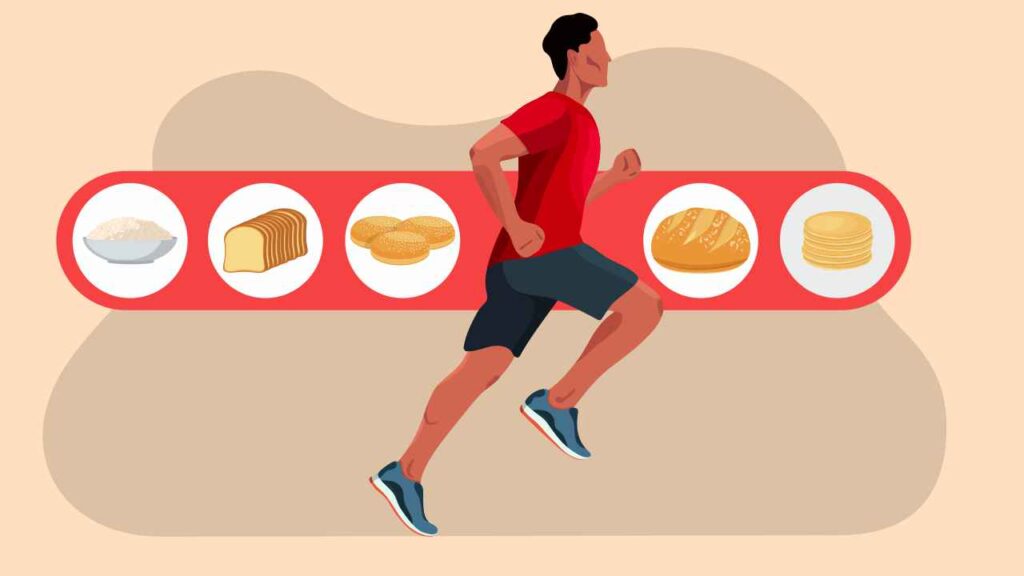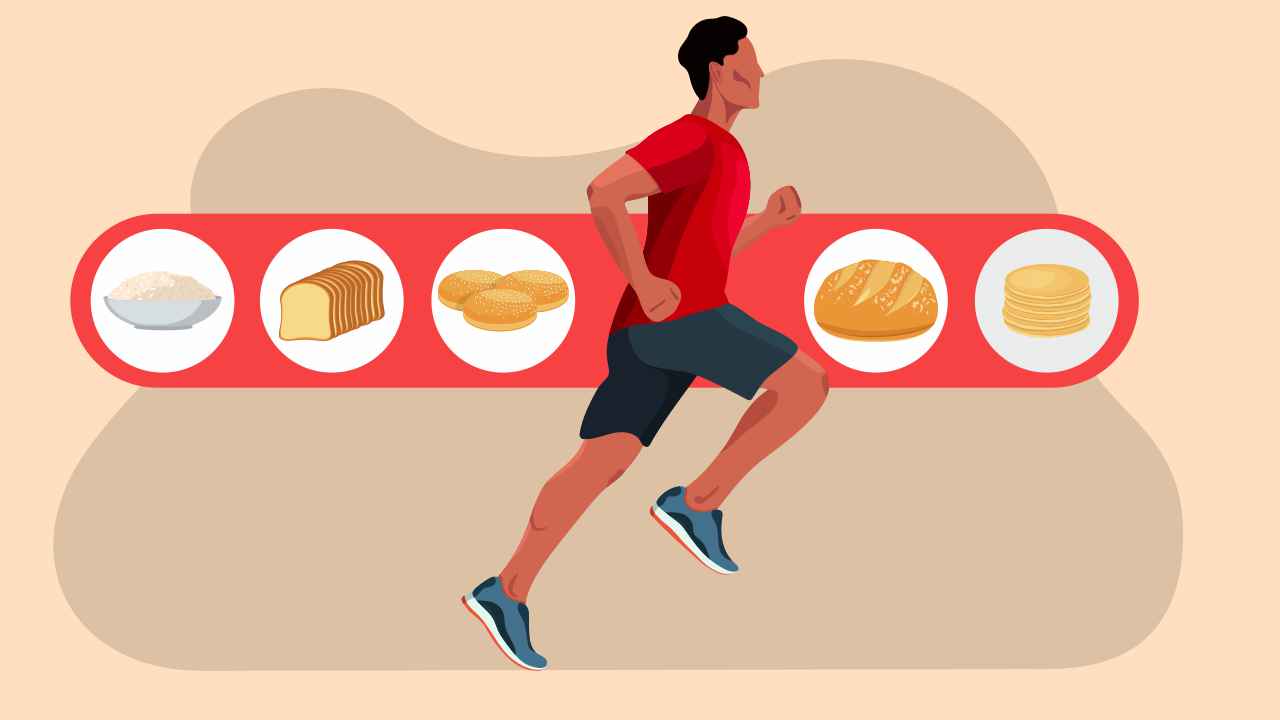
Embarking on a marathon journey requires more than just training but it demands a strategic approach to nutrition that sets your body for optimal performance. Among these strategies, carbohydrate loading stands out as a pivotal method for marathon runners aiming to maximize their energy reserves and endurance. This blog will delve into the art and science of carbohydrate loading, offering a comprehensive guide to optimizing your pre-marathon nutrition for enhanced performance and endurance. Whether you’re a seasoned marathoner or a first-timer, understanding the nuances of carbohydrate loading can be the key to crossing the finish line with energy to spare.
Understanding Carbohdyrate Loading
Carbohydrate loading isn’t just for the pros. It’s a game-changer for any endurance athlete, especially if you’re gearing up for a half-marathon or beyond. But let’s clear something up: carbohydrate loading isn’t about gobbling down a giant bowl of pasta or a whole pizza the night before your race. There’s a science to it—a method to the carbohydrate madness, if you will.
Carbohydrate loading is an essential strategy for endurance athletes, aimed at maximizing their stamina and performance during prolonged physical activities. This process involves a significant increase in carbohydrateohydrate intake, typically 1-3 days before the event (Hawley, 1997). The primary goal of carbohydrate loading is to boost the body’s glycogen reserves, particularly in the muscles, which are a critical energy source during exercise (Gildersleeve, 2012).
Glycogen is a form of energy storage in the body. Think of it like a reserve tank of fuel. It’s mainly stored in the liver and muscles. When your body needs extra energy, like during exercise or between meals, it breaks down glycogen into glucose, which is a type of sugar that your cells use as fuel. This process helps to keep your energy levels steady. In simple terms, glycogen is your body’s way of storing extra energy for when it’s needed.
Glycogen, stored in the muscles, is the preferred fuel for muscular tissue during high-intensity or endurance activities. It’s produced within the body from the carbohydrate we consume. By increasing carbohydrateohydrate intake before an event, athletes can significantly enhance their muscle glycogen stores (Kolby, 2020). This strategic approach ensures that the muscles have an ample supply of energy, which is particularly crucial during strenuous activities that demand sustained physical effort.
The concept of carbohydrate loading is based on the understanding that while the body has limited glycogen storage capacity, this capacity can be optimized through dietary strategies. When an athlete consumes carbohydrate in large quantities prior to an event, it leads to an increase in the amount of glycogen stored in the muscles. This elevated glycogen level allows the muscles to work at their optimal capacity for a more extended period, delaying the onset of fatigue and enhancing overall endurance.
Carbohydrate loading, therefore, is more than just eating more carbohydrates; it’s a deliberate and structured approach to nutrition, aimed at ensuring that endurance athletes have the necessary energy reserves to perform at their best during long-duration sports events. This method is particularly beneficial for activities like marathons, triathlons, and long-distance cycling, where maintaining a consistent energy supply is crucial for both peak performance and overall endurance.
Who should carbohydrate load?

- Endurance Athletes: Those participating in long-distance running , swimming, and cycling events often find carb loading beneficial. General rule of thumb is if you are running more than 2 hours at high intensity you should carb load. These activities typically require sustained energy over a long period, making ample glycogen stores crucial.
- Competitive Team Sports Players: Athletes in sports like soccer or basketball, which may involve back-to-back games or intense periods of play, can also benefit from carb loading. It’s especially useful for events or tournaments where the duration of activity extends beyond 90 minutes or multiple games are played with short recovery periods.
- Multiple Activity Athletes: For those engaged in several athletic activities with less than 8 hours of recovery time between them, carb loading can provide the necessary energy to maintain performance across all events.
Calculate how many carbohydrates you need
To effectively implement carbohydrate loading, it’s important to recognize that each runner requires a slightly different approach, largely influenced by body weight and the anticipated energy expenditure during the event. A good rule of thumb is to begin carb loading 2-days before your race, aiming for an intake of about 8-12 grams of carbohydrates per kilogram of body weight per day. This range allows for some flexibility based on individual needs and preferences. For instance, a lighter runner with a less intensive race plan might lean towards the lower end of this range, while a heavier runner or someone tackling a more demanding course might find better results at the higher end. If your carbohydrate loading amount exceeds 600g of carbohhydrates in a single day, then opt for a 3-day carbohdyrate load rather than a 2-day carbohdyrate load. Remember, this isn’t a one-size-fits-all prescription but a starting point to tailor your carb loading strategy to your unique requirements.
The first step in developing your carb loading plan is to calculate the total amount of carbohydrates you’ll need. This calculation is based on your body weight and the recommended carbohydrate intake per kilogram of body weight. Here’s how you can do it:
Determine Your Weight in Kilograms:
If you know your weight in pounds, divide it by 2.2 to convert it to kilograms. For example, if you weigh 150 pounds, your weight in kilograms is approximately 68 (150 ÷ 2.2).
Calculate Your Carb Intake:
Multiply your weight in kilograms by the recommended carbohydrate intake, which is 8-12 grams per kilogram. Using the same example, if you weigh 68 kilograms, your carb loading intake would range from 544 grams (68 kg x 8 g/kg) to 816 grams (68 kg x 12 g/kg) of carbohydrates per day.
Adjust Based on Energy Expenditure:
Consider your planned energy expenditure. If you’re preparing for a particularly strenuous event or if you have a higher training volume, you might need to aim for the higher end of the range. Conversely, for lighter training or shorter events, the lower end might be sufficient.
Remember, this calculation provides a ballpark figure for your carbohydrate needs. It’s important to listen to your body and adjust your intake based on how you feel during training sessions.
Practice Carbohdyrate Loading
The importance of practicing your carbohydrate loading regimen cannot be overstated. It’s a crucial part of your preparation for any endurance event. Just like you train your body to adapt to the physical demands of the event, you also need to train your digestive system and metabolism to handle and optimize the increased carbohydrate intake.
As you prepare for your race, remember that the diligence and commitment you’ve shown in your training and nutrition are the building blocks of success. Carb loading is more than just a dietary tactic; it’s a testament to your dedication to optimizing your performance and reaching new heights in your athletic endeavors.
To ensure you’re fully confident and informed about your carbohydrate loading strategy, I offer personalized sessions tailored to address your concerns and questions. If you’re navigating uncertainties or seeking expert guidance, consider scheduling a one-on-one consultation. This personalized approach allows us to delve into your specific needs and craft a plan that aligns with your marathon goals. Click here to book your session or review the different program options Click here. Alternatively, if you’re contemplating whether we’re the right match for your training and nutrition journey, I invite you to a complimentary 15-minute consultation call. This initial conversation is an opportunity for us to explore how we can work together to achieve your marathon success. Click here to arrange your call and take the first step towards optimizing your performance.
Good luck on your upcoming race!
References
- Hawley, J. A., Schabort, E. J., Noakes, T. D., & Dennis, S. C. (1997). carbohydrateohydrate-Loading and Exercise Performance. Sports Medicine, 24(2), 73–81. https://doi.org/10.2165/00007256-199724020-00001
- Gildersleeve, J. C. (2012). carbohydrate loading strategy is spot on. Nature Chemical Biology, 8(9), 741–742. https://doi.org/10.1038/nchembio.1049
- Kloby, L., Norman, M., & Per Bendix Jeppesen. (2020). The Effect of Ingesting carbohydrateohydrate and Proteins on Athletic Performance: A Systematic Review and Meta-Analysis of Randomized Controlled Trials. Nutrients, 12(5), 1483–1483. https://doi.org/10.3390/nu12051483
